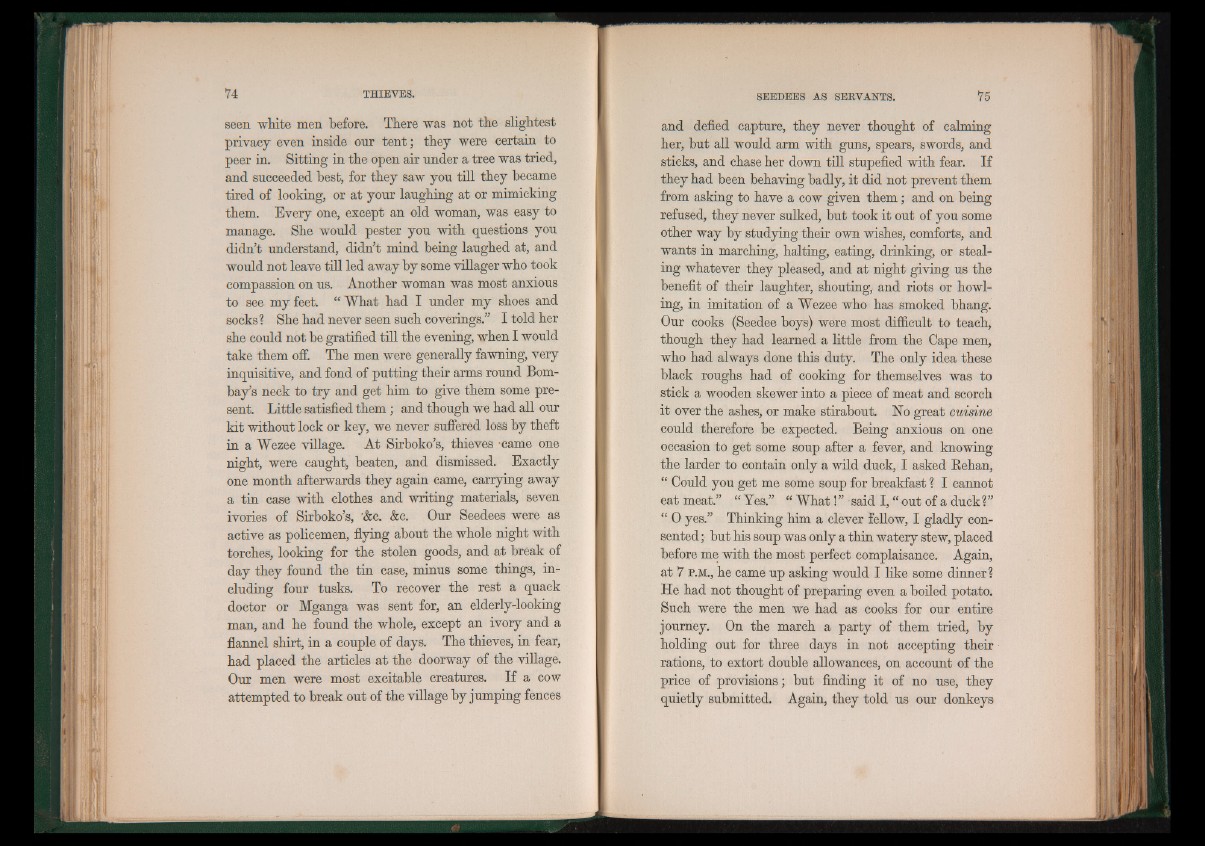
seen white men before. There was not the slightest
privacy even inside our tent; they were certain to
peer in. Sitting in the open air under a tree was tried,
and succeeded best, for they saw you till they became
tired of looking, or at your laughing at or mimicking
them. Every one, except an old woman, was easy to
manage. She would pester you with questions you
didn’t understand, didn’t mind being laughed at, and
would not leave till led away by some villager who took
compassion on us. Another woman was most anxious
to see my feet. “ What had I under my shoes and
socks? She had never seen such coverings.” I told her
she could not be gratified till the evening, when I would
take them off. The men were generally fawning, very
inquisitive, and fond of putting their arms round Bombay’s
neck to try and get him to give them some present.
Little satisfied them; and though we had all our
kit without lock or key, we never suffered loss by theft
in a Wezee village. At Sirboko’s, thieves 'came one
night, were caught, beaten, and dismissed. Exactly
one month afterwards they again came, carrying away
a tin case with clothes and writing materials, seven
ivories of Sirboko’s, &c. &c. Our Seedees were as
active as policemen, flying about the whole night with
torches, looking for the stolen goods, and at break of
day they found the tin case, minus some things, including
four tusks. To recover the rest a quack
doctor or Mganga was sent for, an elderly-looking
man, and he found the whole, except an ivory and a
flannel shirt, in a couple of days. The thieves, in fear,
had placed the articles at the doorway of the village.
Our men were most excitable creatures. If a cow
attempted to break out of the village by jumping fences
and defied capture, they never thought of calming
her, but all would arm with guns, spears, swords, and
sticks, and chase her down till stupefied with fear. If
they had been behaving badly, it did not prevent them
from asking to have a cow given them; and on being
refused, they never sulked, but took it out of you some
other way by studying their own wishes, comforts, and
wants in marching, halting, eating, drinking, or stealing
whatever they pleased, and at night giving us the
benefit of their laughter, shouting, and riots or howling,
in imitation of a Wezee who has smoked bhang.
Our cooks (Seedee boys) were most difficult to teach,
though they had learned a little from the Cape men,
who had always done this duty. The only idea these
black roughs had of cooking for themselves was to
stick a wooden skewer into a piece of meat and scorch
it over the ashes, or make stirabout. No great cuisine
could therefore be expected. Being anxious on one
occasion to get some soup after a fever, and knowing
the larder to contain only a wild duck, I asked Behan,
“ Could you get me some soup for breakfast ? I cannot
eat meat.” “ Yes.” “ W hat!” said I, “ out of a duck?”
“ 0 yes.” Thinking him a clever fellow, I gladly consented;
but his soup was only a thin watery stew, placed
before me with the most perfect complaisance. Again,
at 7 p.m., he came up asking would I like some dinner?
He had not thought of preparing even a boiled potato.
Such were the men we had as cooks for our entire
journey. On the march a party of them tried, by
holding out for three days in not accepting their
rations, to extort double allowances, on account of the
price of provisions; but finding it of no use, they
quietly submitted. Again, they told us our donkeys